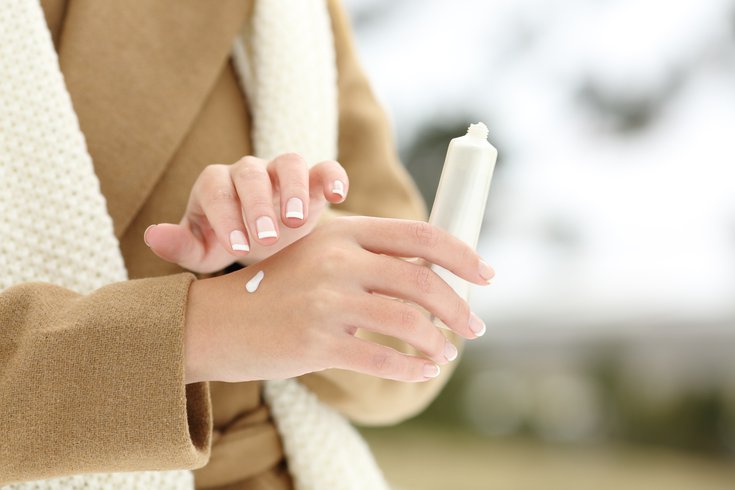
February 17, 2021
 Anastasia Ostapovych/Unsplash
Anastasia Ostapovych/Unsplash
To prevent dry skin, the American Academy of Dermatology Association recommends using a cream or ointment instead of a lotion.
People who experience dry, itchy skin during the winter months don't have to suffer in silence.
Dermatologists say practicing certain daily habits can help their skin better retain moisture and gain some much-needed relief.
During the cold winter months, the humidity level drops both outside and indoors, with people spending long hours cooped up inside.
The low humidity level can have an adverse effect on the epidermis, the outermost layer of the skin, according to Harvard Health. Frequent hot showers, the use of harsh soaps, aging and certain medical conditions also can contribute to dry skin.
"Think of the epidermal skin cells as an arrangement of roof shingles held together by a lipid-rich 'glue' that keeps the skin cells flat, smooth and in place," a Harvard Health blog post explains. "Water loss accelerates when the glue is loosened by sun damage, over-cleansing, scrubbing or underlying medical conditions — or by winter's low humidity and the drying effects of indoor heat."
So what are the best ways to prevent rough, flaking, itching and cracking skin? Here are 10 tips from Harvard Health, Penn Medicine and other dermatology experts:
1. Use a skin moisturizer every day. The American Academy of Dermatology Association recommends using a cream or ointment instead of a lotion. Look for one with at least one of these ingredients: jojoba oil, dimethicone, glycerin, hyaluronic acid, lactic acid, lanolin, mineral oil, petrolatum or shea butter. For best results, apply moisturizer while the skin is still damp from a shower or bath.
2. Use a humidifier in the winter to increase the humidity levels indoors. New York City dermatologist Shari Marchbein told Vogue that to reduce the damage dry heat can cause, set up a cool humidifier in the bedroom and try to keep the heat at a low or moderate temperature.
3. Take shorter baths or showers. People who take daily baths or showers should keep them to 5-10 minutes and use lukewarm water rather than hot water.
4. Avoid deodorant or perfumed soaps and skin products that contain alcohol. They tend to zap the moisture from the skin.
5. Be gentle with your skin when using a washcloth or drying off. Pat the skin gently; rubbing it only will irritate it more.
6. Avoid scratching. A moisturizer should help control the itch, but for really itchy spots, a cold compress can offer some relief.
7. Use sunscreen all year to slow down the aging process. Dermatologists recommend using a sunscreen with at least SPF 30.
8. Don't wear fabrics that irritate the skin. Also choose fragrance-free laundry detergents and avoid adding fabric softener when washing clothes.
9. Add an overnight skin cream to your daily skin regiment. Heavier creams with emollients can help replenish and heal skin while you sleep.
10. Stay hydrated and eat healthy. Foods rich in antioxidants and omega-3 fatty acids such as carrots, green leafy vegetables, fish, nuts and berries are good for the skin.
Penn Medicine dermatologist Susan Taylor advises people to make an appointment with a dermatologist if they don't experience some relief after following these strategies for a week — especially if the itching is causing bleeding or the loss of sleep. A chronic health condition or infection may be causing the symptoms. A prescription treatment, such as corticosteroids, may be necessary.